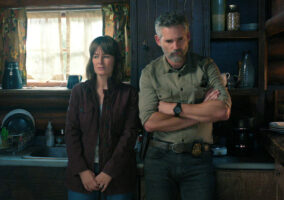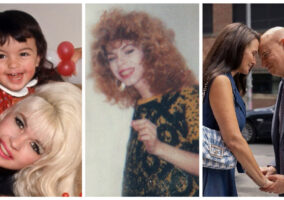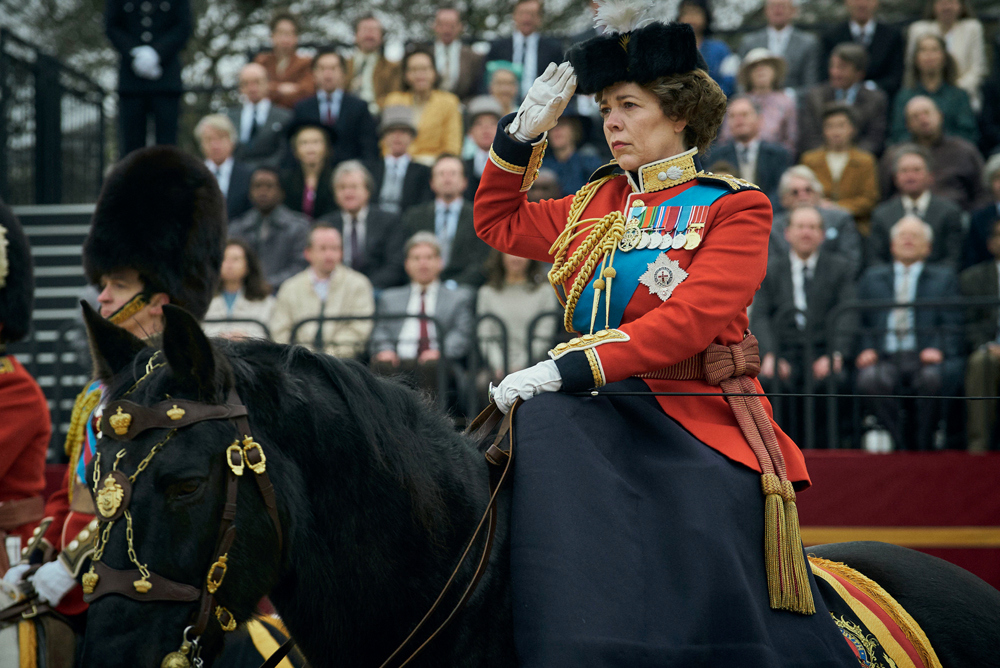
The Crown opens its fourth season with the ultimate in table-setting episodes and a newfound clarity (if not simplicity) in its storytelling. The Crown‘s writer and executive producer Peter Morgan has always made some rather facile connections between the events of history and the emotions of major historical figures – and to be fair, this season still sometimes makes some curiously strained points about political power and affairs of the heart – but in the decade of the 1980s, he has found the perfect backdrop to explore these themes. No other decade in the current British royal family’s history so effectively demonstrated what happens when royals let emotions (or the suppression of them) run roughshod over their lives. As we said in our pre-season review, this will be the most soap operatic season of the show but that’s fine and good, because the decade of the 1980s really was that melodramatic; not just for the Windsor-Mountbattens, but for Great Britain as a country.
“Gold Stick” opens quietly, with Olivia Colman getting a few moments to herself to quietly express The Queen’s lifelong love of and connection with her horses. As she and the senior members of the family ride out in full regalia for the annual Trooping the Colour, a narration of threats and anger by an unseen member of the IRA plays, reminding the viewer that this was the time of The Troubles in Northern Ireland and that a good deal of the angry rhetoric coming from the leaders of the IRA centered around the Queen herself, as well as her surrounding family. From there, we cut to a family lunch as everyone but Charles sits down to gossip about Charles’ marriage prospects. The Queen perks up at the idea of “Johnny’s girl,” Sarah Spencer. Philip takes the moment to confront Dickie about his bad advice to Charles regarding Camilla. There’s clear bitterness and resentment in his voice and this scene is tinged with a ton of foreboding – although not nearly as much foreboding as the somewhat creepy meet-cute moment when Charles meets the underage (and extremely child-like) Diana.
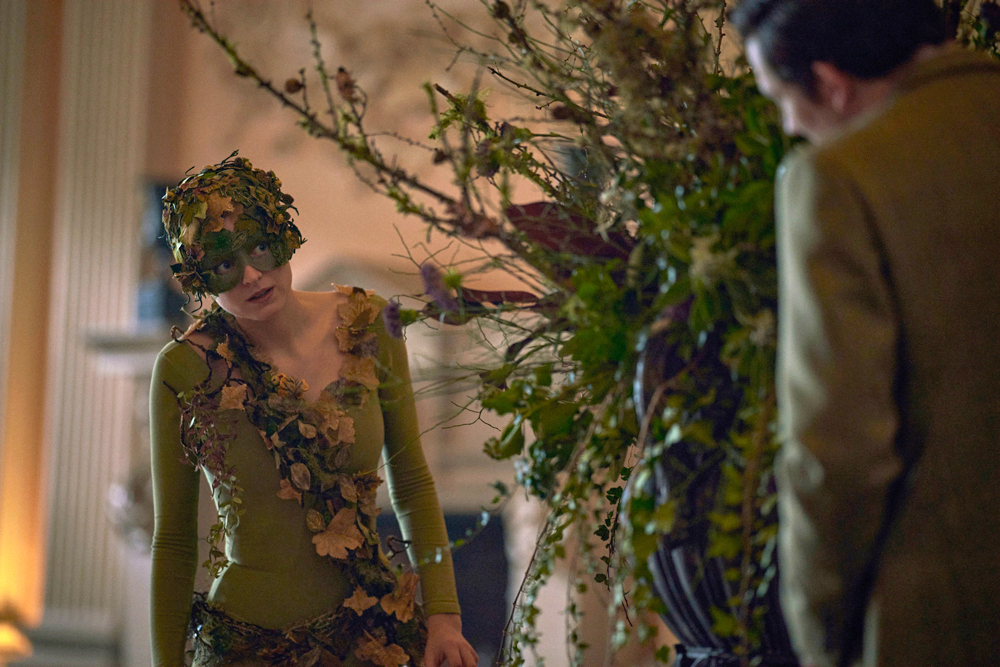
We don’t know if Morgan was deliberately trying to upend the Manic Pixie Dream Girl trope by having Diana show up in such a dreamy, mysterious manner (in a pixie costume, no less), but he certainly underlined both the age difference between the soon-to-be-married couple as well as their somewhat unsavory dynamic. She is in awe of him and he’s paternalistic and condescending toward her (although clearly charmed). With these opening minutes, it’s as if Morgan is saying to the audience. “Here you go. This is what the season’s about. Large-scale political issues and small-scale family issues.” What the story has now that it didn’t quite have in earlier seasons was an audience deeply invested in the events of this season and more well-versed in them than the newsreel footage events of seasons past. This will turn out to be both a blessing and a curse for the season.
But of course the 1980s in Great Britain weren’t just the Diana years, they were also the Thatcher years and Morgan will have his work cut out for him connecting the two storylines in that “all history is personal history” manner that The Crown is more or less based on. As we said in our pre-season review, Gillian Anderson makes some unusual choices in her portrayal of Margaret Thatcher – the strained voice, brittle movements, bent posture, and facial tics don’t always add up to an accurate representation of her – but a lot of them can be explained by her introductory scene. We meet Thatcher not as the Iron Lady of legend, not as the stalwart figure seen on news footage, but as a clearly nervous woman practicing the phrase “we are very confident” over and over again as she prepares to greet the public as their new Prime Minister. This lends some grounding to her somewhat strained performance. The point, it seems, is that Thatcher herself was something of a grand – and exhausting – performance.
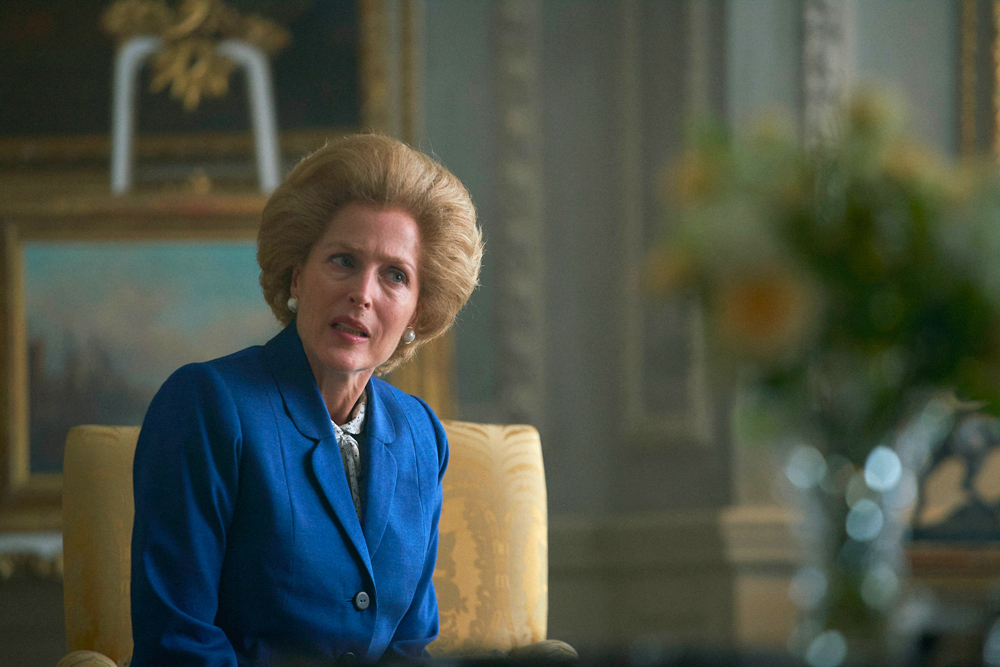
After defending Thatcher from her husband’s entirely expected sexist dismissal of her accomplishments, the Queen is nervous and excited to meet her. Of course she blinks a little at her too-deep curtsy and too-formal bearing, but Elizabeth clearly wants to like her and starts off making domestic small talk about her husband and children, which Margaret finds odd and seems a bit uncomfortable answering. They don’t quite know what to make of each other, even as they acknowledge some of their similarities. Elizabeth guesses 90 percent of Thatcher’s cabinet, which impresses Thatcher tremendously. She doesn’t seem to have much political use for the queen, but understands and is impressed by her symbolic power. Thatcher surprises the Queen by expressing the thought that women are, for the most part, not suited to high office. Because “they become too emotional.” “I doubt you’ll have that trouble with me,” Elizabeth responds, in a moment of pure self-knowledge.
The family rides up to Balmoral and the scenes of Elizabeth riding through gorgeously verdant Scottish vistas feel like the series spending some of that good Netflix money. Philip and Anne have a scene that acknowledges her equestrian career and her troubled marriage, two major aspects of her life that got unremarked upon before now. It’s a good scene that establishes Philip and Anne as allies who understand what it’s like to be around the throne but not on it. He bucks her up and talks of her “Battenburg refusal to give in.” It’s good to see Erin Doherty get a little more time to explore Anne’s famously prickly personality. Of all the royal children, she is the most like her two parents, which may be why Morgan gave her such short shrift last season.
Speaking of the Battenburg family name, Dickie Mountbatten is shown at his castle in County Sligo in Ireland, where he calls Charles who’s off fishing in Iceland. In some very heavy foreshadowing, he tries to talk Charles away from Camilla. Charles, of course, acts like a total brat, calling him a “quisling.” Those who know their history can feel the foreboding, but for those who don’t, Morgan lays it on thick in the scenes leading up to Dickie’s assassination. The sequence is drawn out to nearly its breaking point, with Elizabeth and Anne stalking, Philip shooting game, Charles fishing for salmon and Dickie catching lobster. Everyone in the family is off killing things while enjoying a life of high privilege. This sort of subtle disparagement of the family is somewhat new for Morgan and it will define the season going forward.
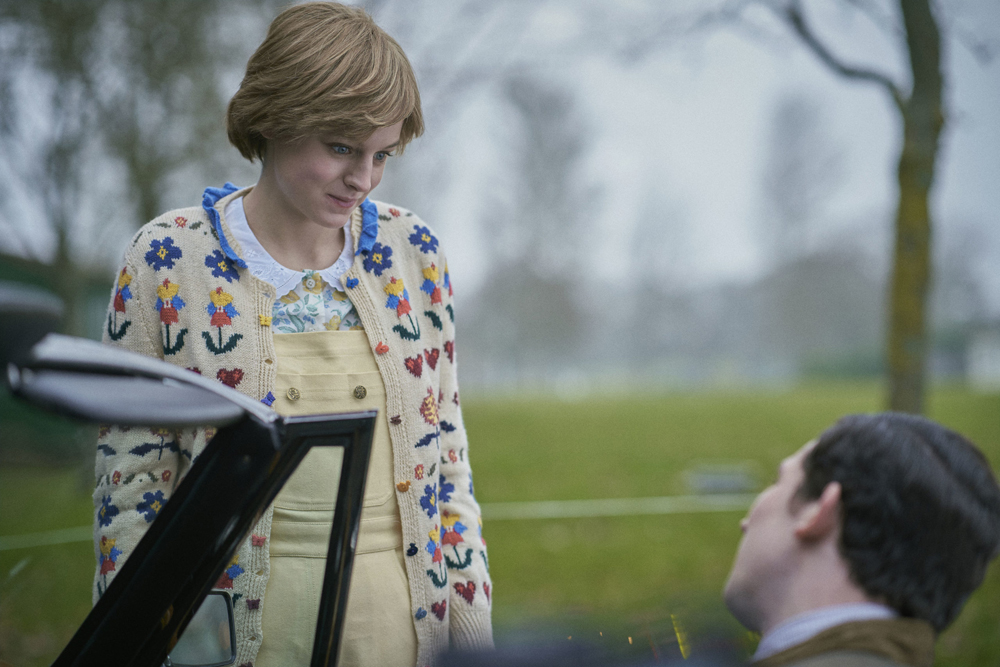
Thatcher promises the Queen that she will wage relentless war on the IRA without mercy until that war is won. The Queen doesn’t react to the bloodthirsty tirade. Morgan leaves it up to the viewer to decide if she supported Thatcher’s actions in Northern Ireland, which is a bit of a copout. After that, there is incredibly long scene of Philip drunkenly confronting Charles about shoving him aside for Dickie as a father figure, wherein all the subtext of the various relationships become overt and obvious text, stated outright, over and over. “Architecturally, there is little that is normal about this family,” he tells his son, which could serve as an overarching theme for the story that’s about to launch.
Charles and Diana get a second meet-cute, which is decidedly less creepy, even if she is dressed like a toddler. It’s the first time we get to see Emma Corrin really inhabit the soon-to-be Princess of Wales. She absolutely nailed the voice. Their entire conversation was about her feeling sorry for him and expressing sympathy, which exactly the kind of attention he’s craved his whole life. You can see why he was intrigued by her, even as the show goes to great lengths to point out how much he was pushed into finding someone – anyone – to shut his family up. As Dickie wrote in his final letter to Charles, he is feeling enormous pressure regarding “the importance of building your destiny with some sweet and innocent, well-tempered girl with no past, who knows the rules and will follow the rules.” There’s no subtlety here, but for once, there doesn’t have to be. The 1980s are off and running.
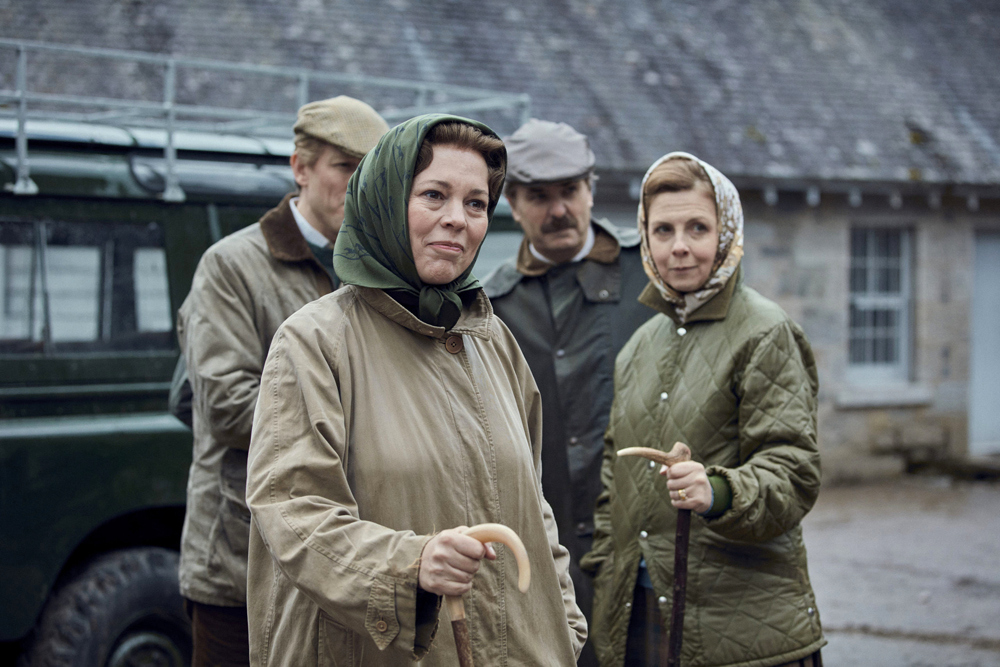
With “The Balmoral Test,” Morgan injects some heavy-handed metaphor into the story. In the 2006 Helen Mirren film The Queen (written by Morgan), a wounded prize stag wandering the grounds of Balmoral serves as a metaphor for Princess Diana; a reference to her brother’s famous eulogy of her, where he noted that the most hunted woman of her age was named for the goddess of the hunt. It was heavy-handed then and it’s no less so when he returns to the metaphor here. We’ll give him a little credit for having Charles himself refer to the symbolism as “grotesque,” while (in perfect Charles fashion) missing the point of it and assuming that he is the downed stag in question instead of the young girl whose life he’s about to upend. With this episode Morgan also returns to another beloved theme: that of the royal outsider becoming flustered by all the traditions and etiquette. Standing in for the Kennedys this time are the Thatchers, who fail every test put to them by the family.
But first, Charles takes Diana to the opera, where he immediately takes the opportunity to lecture her on her shallow characterization of Verdi, to which she only replies, “Gosh.” Morgan and Corrin get some of Diana’s tics and phrasing just right; especially her tendency to fall back on slang (“under the circs”) or cliches (“All good things come to those who wait”). He corrects her again when she refers to him as “gentlemanly.” “Princely,” he reminds her. In just a few words, Corrin and O’Connor do a wonderful job of establishing the Charles and Diana relationship in its early stages; she is starstruck and he’s condescending and a little bored.
Meanwhile, Margaret Thatcher is dealing with an unruly cabinet and their outcry over the draconian cuts to social services which would define her administration. “You’re trying to move too fast,” she is told. “That is because I’m in a hurry.” It’s early days in the story, but so far, Morgan is straddling a line between portraying Thatcher as an admirable figure and trying to foreshadow the results of her politics. She and Denis fly to Balmoral for the weekend, where they are put to the infamous “Balmoral Test” of the episode’s title, a series of private assessments and judgments foisted upon all guests at the family getaway to determine whether they are “U or Non-U.” They immediately show up and start failing test after test. Morgan loves to portray outsiders like the Thatcher and the Kennedys as ill-bred podunks, when it doesn’t seem likely that the Thatchers – Margaret especially – would have been so careless or so unlikely to do research ahead of time. Margaret is appalled that they’ve been assigned two bedrooms or that the maid would think to unpack her husband’s luggage. To be fair, Thatcher is reported to have loathed her times at Balmoral and is said to have deliberately not packed stalking gear or outdoor wear for her visits. This seems more like her patented Thatcher stubbornness than an uncharacteristic ignorance about what was expected of her. Still, there’s a bit of a difference in how Morgan chose to portray the family this time. It’s no small trick to make Margaret Thatcher come off like a sympathetic figure, but Morgan did the one thing he’s most reluctant to do in order to pull it off: he made the royal family look like an utter nightmare to be around.
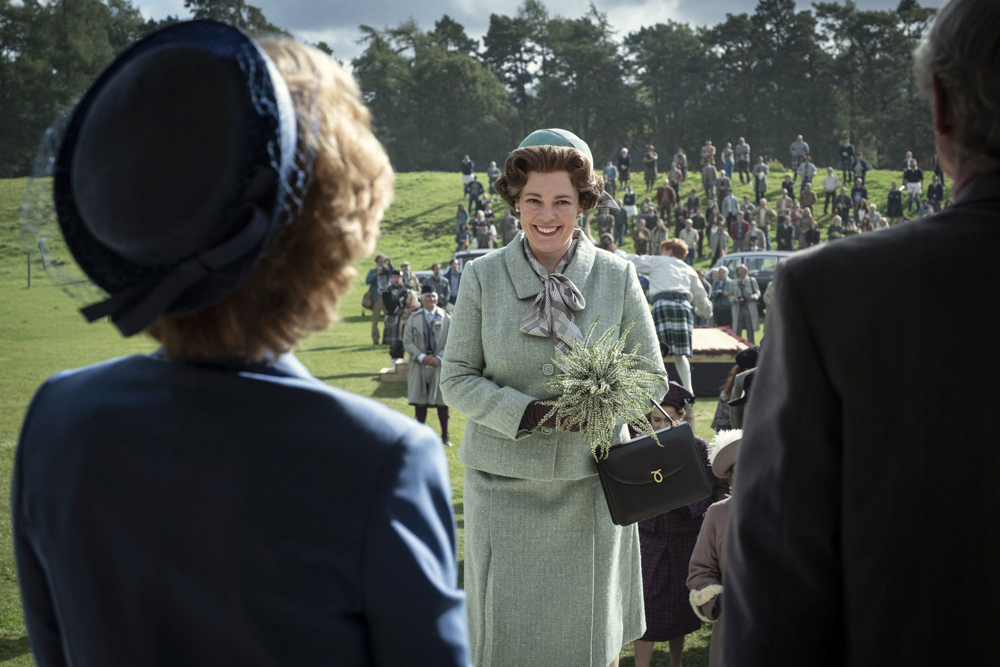
The Thatchers dress for dinner hours too early and the family is rude about their faux pas, although Elizabeth tries to pass it off. “Do you think they’ll come to lunch tomorrow in their pajamas?” asks Philip loudly. The Queen Mother blithely refers to Denis Thatcher’s “ignorance” sitting two inches away from him. Margaret dressed them down like unruly servants, having the sheer gall to criticize their work ethic and to advise that more time at idle play would give them “perspective.” Don’t even get us started on the horror show of “Ibble Dibble.” As always, Elizabeth is portrayed as the most empathetic member of the family, although it’s tinged with quite a bit of passive-aggression. She commands her family to “Say nothing” when Thatcher comes down for stalking in a business suit in heels but then drives her out to the middle of nowhere and criticizes her suit, her perfume and the noise she makes before suggesting she go back, apparently completing forgetting the illuminating conversation they had during their drive, when Thatcher points out that her upbringing didn’t allow her time or interest in idle pursuits. “Work was our play.”
Morgan gives the Thatchers as much room to criticize the family as the family got to criticize them, however. “We don’t want to catch any upper class habits,” she advises her husband, who describes the whole weekend at Balmoral as a “Half-Scottish half-Germanic cuckoo land.” Having had enough of them, Margaret lets loose with a tirade against them. “They aren’t sophisticated, or cultured, or elegant, or anything close to an ideal.” She likens them to the “patronizing bullies” of her own cabinet, which is perhaps too neat a line drawn on Morgan’s part. There were many factors that contributed to Thatcher’s political philosophy and actions, but we doubt very much she fired half her cabinet because she had a bad weekend at Balmoral.
Charles arrives at Balmoral and immediately calls Camilla to pout. Instead, she pushes him to call Diana. “You need to find a young woman who’s free to be where you want when you want and is willing to give up her whole life for you,” she tells him, filling the “foreboding dialogue” hole left by Dickie Mountbatten. Exit Thatchers, enter Diana. Yes, this is all a bit too neat, but the series is covering a lot of ground here and doing a pretty good job of condensing a lot of agendas and events down to a manageable and cohesive storyline. Lady Fermoy, Diana’s grandmother and a lady in waiting to the Queen Mother, greets her upon arrival by telling her this is “the most important weekend of your life.” Diana, a country girl herself, takes to Balmoral like a fish to water and charms the family – and the staff – immediately. “I only brought outdoor shoes” she says to an approving house maid.

Diana spends one dinner with the family – a dinner where the women wonder whether she’s a girlfriend at all – when Philip decides to take her out the next morning and more or less announce to her that she’s in consideration to marry the Prince. There was such an insane push to get this girl in the family simply because she’s good on paper and everyone was sick of Charles’ petulance. Philip understands better than anyone what it is to be married to the sovereign so he was in a unique position to assess her qualifications but it’s crazy to think anyone could size her up as a potential member of the family based on one weekend. This is also about Philip reasserting himself as Charles’ father in the wake of Dickie’s death. He’s jumping the gun on Diana because he wants to be the one who puts the stamp of approval on her before anyone else does.
Corrin and Morgan are threading a needle on Diana. She is literally wide-eyed, naïve and immature, but as her scene arguing with Philip about the direction of the wind showed, she’s canny and a little shrewd. She knows she’s being interviewed for a position and she’s asserting herself with one of the prickliest members of the family. She then lavishes praise on him in front of the entire family, as Elizabeth, the Queen Mother and Lady Fermoy exchange pleased – and knowing – glances. Charles is rightly annoyed by the obviousness of it all (“Rave reviews from the whole ghastly politburo,” as he puts it in a bitter phone call to Camilla). As she leaves after a triumph of a weekend, Charles tells Diana she’s been a great sport and claps his hand on her shoulder in the best approximation of a romantic gesture he can give her.
Thatcher fires and reshuffles half her cabinet as a response, we are meant to believe, to the snobbery of the royal family and their mistreatment of her. The Queen tries to get a few barbs in about outsiders at Balmoral during their weekly meeting, but Margaret won’t have it. The Queen is on her turf now and she lets her know that she fired her cabinet ministers because of the “privilege and entitlement” their backgrounds afforded them. “Always a mistake to assume just because people are privileged, they lack grit,” the queen fires back. Again, Margaret Thatcher’s not having it. She quotes the poet Charles Mackay and all but calls the Queen a useless coward to her face. This is one Prime Minister who will not be cowed by tradition or pomp.
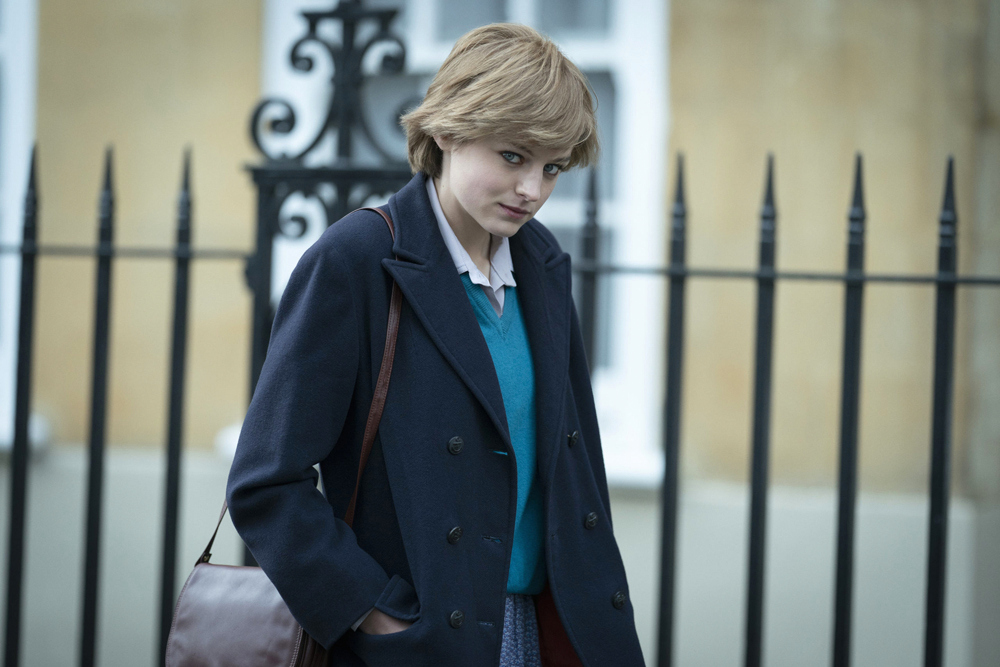
Anne goes to visit Charles and again, the foreboding dialogue is thick and heavy. “Don’t’ fight it,” she pleads with him. “She’s perfect.” And with that, Diana’s head is mounted on the wall of family trophies – almost literally, thanks to Morgan’s self-described “grotesque symbolism” cross-cutting with a scene of Diana being hounded by the press. There’s a disturbing light smirk on her face because the poor girl is enjoying the attention and has no idea what’s in store for her when she enters this weird and difficult family that has no capability for treating outsiders with empathy or kindness.
[Photo Credit: Netflix]
Alexander McQueen Resort 2021 Collection Next Post:
People’s Choice Awards 2020: Jennifer Lopez Slays It in Christian Siriano
Please review our Community Guidelines before posting a comment. Thank you!


